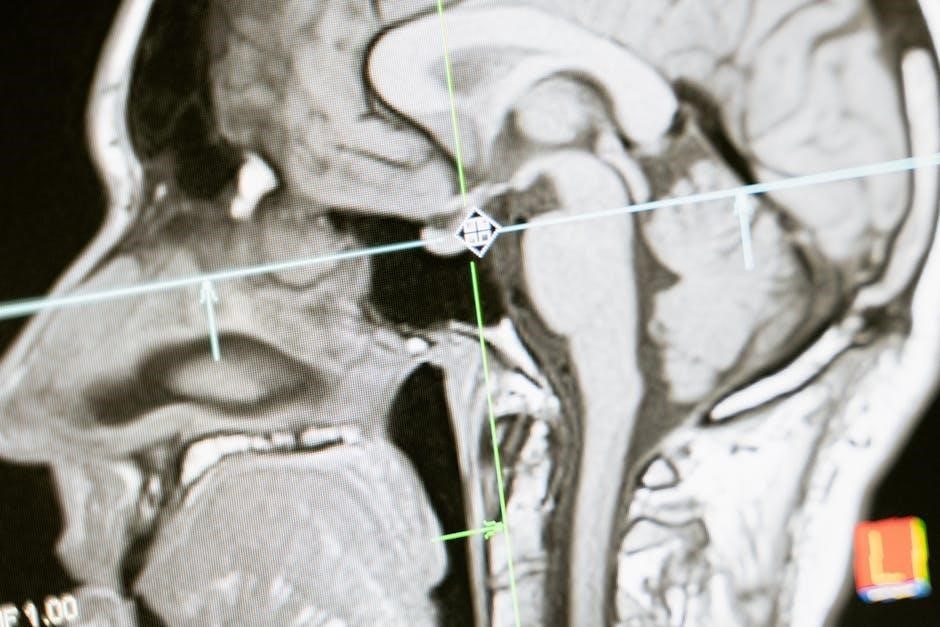The AP Computer Science Principles practice exam is a valuable resource to assess readiness for the official exam, featuring both multiple-choice and free-response sections.

Overview of the AP CSP Exam Format
The AP Computer Science Principles exam is divided into two sections: multiple-choice and free-response. The multiple-choice section lasts 75 minutes, featuring 70 questions that test conceptual understanding. The free-response section, lasting 60 minutes, includes 2 questions (4 prompts), focusing on problem-solving, algorithm design, and code explanation. Students receive a reference sheet for the free-response section but may not use it during multiple-choice. This format assesses both theoretical knowledge and practical application, aligning with the course curriculum. The exam structure is consistent across administrations, ensuring a fair evaluation of computational thinking skills.
Importance of Practice Exams for Preparation
Practice exams are essential for effective preparation, offering a realistic simulation of the actual test experience. They help students assess their understanding, identify strengths, and pinpoint areas needing improvement. By tackling sample questions, students familiarize themselves with the exam format, timing, and question types. Regular practice builds confidence and reduces anxiety, allowing for better time management and strategic thinking during the exam. Utilizing official study guides ensures alignment with the curriculum, providing accurate and relevant material for mastering computational thinking and problem-solving skills required for success in the AP CSP exam.

Structure of the AP Computer Science Principles Exam
The AP CSP exam consists of two main sections: multiple-choice and free-response. The multiple-choice section tests knowledge across various topics, while the free-response section focuses on problem-solving skills.
Both sections are designed to assess computational thinking, algorithm design, and understanding of computer science principles. The exam format ensures comprehensive evaluation of both theoretical and practical abilities.
Multiple-Choice Section: Format and Timing
The multiple-choice section of the AP CSP exam consists of 70 questions, each with four possible answers. Students have 75 minutes to complete this portion.
Questions cover a wide range of topics, including computational thinking, data structures, and algorithms. Timing is crucial, so practice exams help students manage their time effectively.
Each correct answer earns one point, with no penalties for incorrect responses. This section accounts for 60% of the total exam score, making it a critical component of preparation.
Free-Response Section: Requirements and Expectations
The free-response section of the AP CSP exam includes two questions, each with multiple parts, requiring students to demonstrate their problem-solving skills.
Students have 60 minutes to complete this section, which accounts for 40% of the total score. Responses must be clear, concise, and logically structured.
Questions often involve creating algorithms, writing code, and explaining computational thinking processes. Practice exams provide sample prompts to help students prepare effectively.
Key Topics Covered in the AP CSP Practice Exam
The practice exam covers computational thinking, algorithms, programming concepts, data analysis, and the impact of computing, aligning with the AP CSP curriculum framework.
Computational Thinking Practices
Computational thinking practices emphasize problem-solving strategies like decomposition, pattern recognition, abstraction, and algorithms. The practice exam assesses these skills through scenarios requiring logical reasoning and creativity. Students engage in designing algorithms, analyzing data, and solving real-world problems. These questions replicate the exam’s focus on applying computational thinking to diverse challenges, ensuring students are well-prepared for both multiple-choice and free-response sections. The practice exam also includes scoring guidelines to help students understand how their responses align with expected computational thinking practices.

Essential Knowledge Statements
Essential Knowledge Statements are core concepts central to the AP Computer Science Principles curriculum. The practice exam aligns with these statements, covering topics like algorithms, programming, data, and the internet. Questions test understanding of fundamental principles such as variables, conditionals, loops, and functions. Students also encounter problems related to digital information representation and the ethical implications of computing technologies. These statements form the foundation of the exam, ensuring students demonstrate proficiency in key areas through both multiple-choice and free-response questions, mirroring the actual exam’s structure and content focus. This alignment ensures comprehensive preparation for all exam topics.


Benefits of Using the Official Study Guide
The official study guide provides aligned content with the curriculum framework, ensuring comprehensive coverage of exam topics and updated practice questions for the 2024 exam.
Aligned Content with Curriculum Framework
The official study guide aligns perfectly with the AP Computer Science Principles curriculum framework, ensuring that all topics are covered comprehensively. It focuses on computational thinking practices and essential knowledge statements, providing students with relevant examples and exercises. This alignment helps students understand the exam format and content, making their preparation more effective. The guide also includes practice questions that mirror the actual exam, allowing students to familiarize themselves with the types of questions they will encounter. By following the curriculum framework closely, the study guide ensures that students are well-prepared for both the multiple-choice and free-response sections of the exam. Additionally, the guide is regularly updated to reflect any changes in the exam format or content, ensuring that students have the most current and accurate resources available to them. This makes it an indispensable tool for achieving success on the AP Computer Science Principles exam.
Updated Practice Questions for 2024 Exam
The official study guide includes updated practice questions specifically designed for the 2024 AP Computer Science Principles exam, reflecting the latest changes in the curriculum framework. These questions cover a wide range of topics, from computational thinking practices to essential knowledge statements. The practice questions are structured to mirror the actual exam, helping students assess their understanding and identify areas for improvement. Regular updates ensure that the content remains relevant and accurate, providing students with a reliable resource to prepare for the exam. By working through these updated questions, students can build confidence and gain a deeper understanding of the material, ultimately achieving their desired scores on the exam. The guide also offers detailed explanations and solutions, enabling students to learn from their mistakes and refine their problem-solving skills. This makes it an essential tool for anyone aiming to excel on the 2024 AP Computer Science Principles exam. The updated questions also incorporate feedback from previous exams, ensuring that they address common challenges and areas where students often need additional support. As a result, the practice questions are not only comprehensive but also tailored to meet the evolving needs of students preparing for the exam. The study guide’s commitment to providing the most current and relevant practice questions underscores its value as a key resource for successful exam preparation. By utilizing these updated practice questions, students can effectively gauge their readiness for the exam and make informed decisions about their study strategies. The guide’s focus on up-to-date content ensures that students are well-equipped to tackle the challenges of the 2024 exam with confidence and precision.
Resources for Downloading the Practice Exam PDF
The official AP Central website and College Board offer authentic practice exam PDFs. Third-party sites like forums and educational platforms also provide downloadable resources for exam preparation.
Official Sources like AP Central and College Board
The College Board’s official website, AP Central, provides authentic and updated resources for the AP Computer Science Principles exam, including practice exams and study guides. These materials are designed to align with the latest curriculum framework, ensuring students receive accurate and relevant preparation. The official PDFs are available for download, offering a reliable way to familiarize oneself with the exam format and content. Additionally, the College Board regularly updates its resources to reflect changes in the exam structure, making it a trustworthy source for students seeking to excel in their preparation.
Third-Party Websites and Forums

Beyond official sources, third-party websites and forums offer additional resources for the AP Computer Science Principles practice exam. Platforms like Barron’s Test Prep and PrincetonReview.com provide comprehensive study guides and practice tests. These resources often include detailed explanations and sample questions, mirroring the official exam format. Online forums and communities also share user-uploaded practice exams and study materials, which can be valuable supplements to official resources. However, students should verify the credibility and alignment of these materials with the latest curriculum framework to ensure effective preparation for the exam.

Strategies for Effective Practice
- Time Management: Allocate specific time slots for each section to simulate exam conditions and improve efficiency.
- Review Scoring Guidelines: Understand how responses are graded to refine answers and meet exam expectations.
- Focus on Computational Thinking: Practice breaking down problems, designing algorithms, and explaining solutions clearly.
Time Management During the Exam
Effective time management is crucial for success in the AP Computer Science Principles exam. The multiple-choice section has 70 questions, requiring about 1 minute per question. Allocating 75 minutes ensures thorough consideration of each option. For the free-response section, with 2 questions, students should spend 25-30 minutes on each to develop clear, concise answers. Practicing under timed conditions during preparation helps build stamina and reduces anxiety, allowing students to focus on solving problems rather than the clock. Regular practice with timed sections improves both speed and accuracy, enhancing overall performance.
Reviewing Scoring Guidelines and Sample Responses

Reviewing scoring guidelines and sample responses is essential for understanding how to earn maximum points on the AP CSP exam. Official resources, such as those from College Board and AP Central, provide detailed explanations of high-scoring answers. These materials highlight key computational thinking practices and essential knowledge statements demonstrated in successful responses. By analyzing sample answers, students can identify areas for improvement and refine their approach to free-response questions. Aligning personal responses with scoring guidelines ensures clarity and completeness, maximizing the potential for higher scores. Regular review of these resources is a proven strategy for exam success.
The AP Computer Science Principles practice exam PDF is a vital tool for thorough preparation, helping students understand exam formats and build confidence in their abilities.
Final Tips for Maximizing Exam Preparation
To maximize your exam preparation, focus on time management and understanding scoring guidelines. Practice under timed conditions to simulate the actual exam experience. Review sample responses and scoring guidelines to understand expectations. Prioritize weak areas identified through practice tests. Stay updated with the latest curriculum changes and practice exam resources. Engage with study groups or forums for shared learning. Lastly, ensure you are well-rested and mentally prepared on exam day to perform at your best.

Leave a Reply
You must be logged in to post a comment.